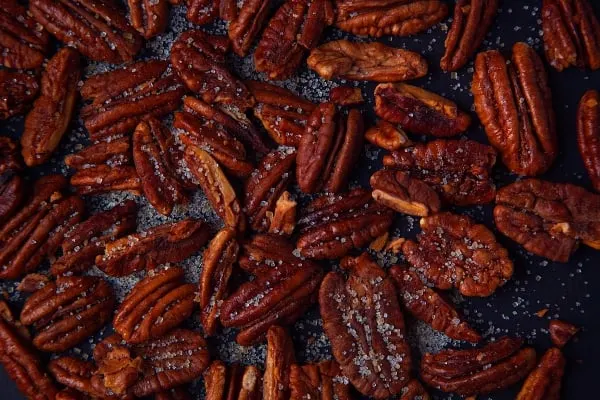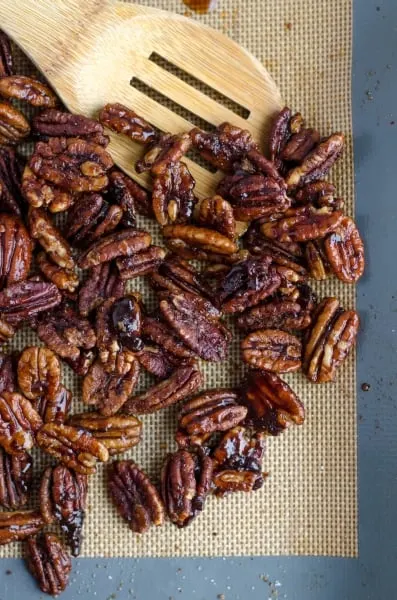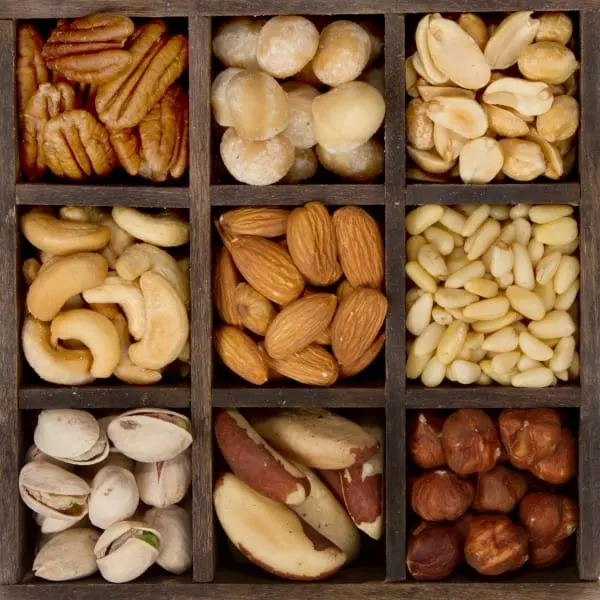In this article, we’re going to cover the shelf life, storage, and spoilage of pecans.
Found an old bag of shelled or in-shell pecans stashed away, and not sure if the nuts are still good to eat? Do pecans go bad?
If that sounds familiar, you’re in the right place. Below, we’re going to cover how long pecans last, the best way to store them, and how to tell when they’re spoiled.
Let’s jump right in.
Table of Contents
- Do Pecans Go Bad?
- How to Tell if Pecans Are Bad?
- How Long Do Pecans Last?
- Storage
- Can You Freeze Pecans?
- Pecans Shelf Life and Spoilage Summary

Do Pecans Go Bad?
The primary way pecans go bad is by going rancid. Like other nuts and fat-rich products, pecans will go rancid if you store them long enough or in poor conditions.
You know your pecan nuts are rancid when they start to taste harsh and bitter. Sometimes they also develop an off smell that might remind you of old paint, nail polish remover, or something else of the like.
That off aroma isn’t always easily noticeable, so in most cases, you need to eat a nut or two to learn that they’re gone.
Furthermore, going rancid is a process that takes weeks, if not months. That means there’s a whole spectrum of flavors between fresh pecans and rancid ones. And it’s up to you to decide that yours are no longer okay to eat.
Fortunately, rancid nuts aren’t unsafe to eat, so you won’t get sick from eating one or two. That said, eating them isn’t healthy either, so devouring a whole bag of rancid pecans isn’t a good idea.
Now, rancidity isn’t the only possible cause of spoilage. Let’s talk about others.

How to Tell if Pecans Are Bad?
Discard your pecans if:
- They’re rancid. Read the previous section to learn about the signs of rancidity.
- There’s mold in the bag. Pecans aren’t prone to mold growth, but that doesn’t mean that scenario is impossible. If you notice any mold, discard the nut(s).
- There are pantry bugs in the bag. When talking about pantry pests, we usually think about products such as flour and sugar. But these insects infest nuts too. So if you find any bugs in the bag, dead or alive, discard those pecans. And clean out the pantry so that they don’t spread.
Once again, if your pecans sit in storage for a long time, chances are they’ll go rancid. The other options are much less common.
Now, what if your pecans aren’t rancid, but taste stale and you don’t find them good enough for snacking anymore?
Using Stale Pecans
If your pecans aren’t up to par flavor-wise, here’s what you can try:
- Toast them. Toasting helps bring out the flavor of pecans, and you can toast yours no matter if they’re fresh or old and stale. Here’s how.
- Fold them into baked goods. Muffins, cupcakes, and all sorts of other baked goods can benefit from a handful of chopped pecans. Adding nuts helps many “plain” recipes stand out by adding that extra crunch factor.
- Top desserts. Grab your plain vanilla ice cream and top it with some cut-up pecans and perhaps a bit of grated dark chocolate for some variety.
- Make a salad. Pecans might not work that well in some salads, so I suggest going with a recipe that specifically calls for pecans. Just to be safe.
Long story short, stale pecans still work quite alright when mixed with other ingredients. Just don’t make them the star of the show. In other words, don’t use them for baking pecan pie.

How Long Do Pecans Last?
Shelled pecans last about 3 months at room temperature and about a year in the fridge. On the other hand, in-shell pecans keep for at least 4 months on the counter and more than a year if refrigerated.
If those periods aren’t long enough for your needs, you can freeze both shelled and in-shell pecans.
(More on freezing later on.)
As is the case for all nuts, there isn’t one set of shelf life guidelines that everyone agrees with. Instead, various sources have slightly different suggestions.
For instance, Georgia Pecan Farms says shelled pecans keep at room temperature for only two months.
Because of that, treat the periods I outlined as rough estimates, not strict rules.
That means you shouldn’t rely on those dates and periods too much. Instead, you should always check the quality of your pecans before deciding what to do with them.
Shelled vs. In the Shell Shelf Life
Pecan shells protect the nuts quite well, which usually allows them to last quite a long time without refrigeration. So while the four-month period above doesn’t look particularly impressive, other sources claim they keep for even 6 to 12 months at room temperature.
In other words, there’s much more wiggle room if your pecans are still in the shell.
For shelled pecans, all that protects them is the container or bag they’re in. That means you shouldn’t expect them to retain quality for much longer than the mentioned three months in the pantry.
Long story short, if you’re storing in-shell pecans, they’ll be fine for a long time, even if the storage conditions you provide are far from perfect. Unfortunately, that’s not the case for shelled pecans.
“Expiration” Date
Bagged pecans typically come with a date printed on the label. That date is a best-by date, meaning it’s a rough estimate of how long those nuts should retain quality.
It’s not an expiration date by any means, and the fact that your pecans are a couple of weeks (or months) past doesn’t mean they’ll be rancid.
They might be, but you can’t know that until you give them a good whiff and test them for rancidity. (More on that in the spoilage section.)
Plus, if it’s in-shell pecans we’re talking about, they easily keep for months past the printed date, assuming you store them in half decent conditions.
In short: check the quality instead of relying on the date on the label.

Storage
Store your pecans in an airtight container or freezer bag that’s sealed tight in a cold and dark place. They keep best in the fridge or frozen, but you can also store them in the pantry or even leave them on the counter for a couple of months without sacrificing the quality that much.
Most sources suggest refrigeration or freezing as the best storage options, but leaving pecans at room temperature is also an option. The only downside is that the storage time shortens significantly, especially for shelled pecans.
When it comes to types of containers, anything that works for you is an option. That means plastic containers, glass containers, or even mason jars, if that makes sense in your situation.
Now, let’s get into the details.
How to Store Pecans in the Shell
You can store in-shell pecans in a ventilated bag or container in a cool place away from sunlight. A cupboard in the kitchen or pantry is a good choice. Alternatively, you can transfer the nuts to an airtight container or resealable bag and refrigerate them.
As you already know, unshelled pecans are well protected by their shells, so they don’t need any extra protection if you leave them at room temperature. Some ventilation is enough to keep them nice and dry for months.
But if you’re thinking about refrigerating them, it’s best to seal them in a bag or container. That bag will keep any moisture away, helping the pecans last longer.
How to Store Shelled Pecans
Shelled pecans need to be sealed tight in a plastic bag or container. You can leave them at ambient temperature for a couple of months, but make sure they’re in a dark place away from heat sources. Alternatively, you can just place that container or bag in the fridge, which is recommended.
Since shelled pecans have no built-in protection against the outside environment, they’re much more delicate than in-shell ones. And that’s why it’s crucial to provide them with some basic cover in the form of a bag or container.
Furthermore, if you want to refrigerate shelled pecans, that bag or container is a must. It will keep the nuts safe from moisture and absorbing odors from other foods.
The same practices work well when storing unshelled hazelnuts, peanuts (How long do peanuts last?), and walnuts (Do walnuts go bad?).
Last, let’s talk about freezing.

Can You Freeze Pecans?
You can freeze both in-shell and shelled pecans, and that’s the storage option recommended by many sources. That’s because freezing pecans allows you to store them without quality loss for more than two years.
The procedure is as simple as it gets and takes only a minute or so.
Here’s how you freeze pecans:
- Place pecans in a freezer bag.
- Squeeze out the air and seal the bag. Label the bag if you like.
- Freeze it.
All you need to freeze pecans is a freezer bag (or a few) and some space in your freezer. There are no extra steps like pre-freezing or any of that. You open your freezer, chuck the bag, and you’re done.
So, how long can you freeze pecans?
You can freeze pecans for two to five years without noticeable quality loss if you seal them tight. And if you defrost too many, you can chuck them back in the freezer. In other words: refreezing pecans is okay.
When you’re ready to eat or use them, let them come to room temperature before preparing.
Pecans Shelf Life and Spoilage Summary
Thanks for reading this guide on pecan nuts. Here are the main takeaways:
- Pecans go rancid if stored too long or in poor conditions. Other spoilage signs include pantry bugs or mold growth. Rancidity is by far the most common one.
- Rancid pecans taste sharp or bitter and sometimes smell like nail polish remover or old paint. If your old pecans smell fine, eat a couple before making pecan pie, just to be sure.
- The date printed on bagged pecans is a best-by date, and it’s not an expiration date by any means. It’s better to pay attention to the quality of your pecans than to the date on the label.
- Shelled pecans last for about a year in the fridge and even longer in the freezer. You can also store them at room temperature for about three months.
- Unshelled pecans last more than four months (up to a year) on the counter and much longer in the fridge or freezer.